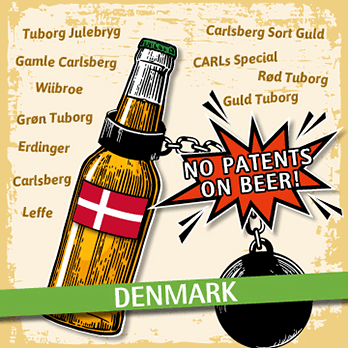



THIS PAGE IS NOT BEEING UPDATED ANYMORE.
Stay updated on the homepage of NO PATENTS ON SEEDS!
The overwhelming support from civil society has shown once again that the patenting of life and the appropriation of our natural resources by large corporations provoke considerable resistance in society: Over 40 organizations have filed an opposition against the beer patents of Carlsberg and Heineken. In addition, the Swiss organizations Public Eye, Swiss Aid and ProSpecieRara handed over 9,000 Swiss signatures against the patent of Carlsberg and Heineken to the Federal Councilor Sommarruga at the end of June. However, opposition proceedings may take years.
Nonetheless, the alarming decision of the Administrative Council on 28/29 June would not have prevented this patent. Although the prohibitions in the European Patent Law were partially strengthened, they do not provide long-term solutions. Plants and animals remain patentable!
The EPO will now resume all patent and opposition proceedings, including 300 patent applications on plants, that have been paused because of the legal uncertainties.
We will follow the future decisions of the European Patent Office closely, and therefore we again need the support of civil society to mobilize politicians to take responsibility for protecting our natural resources!
Hearings for two of the beer patents (EP 2373154, EP 2384110) are scheduled for 2 and 8 of October 2018.



A reminder:
The European Parliament, the EU Commission and governments of the EU member states are all demanding a stop to granting patents covering plants and animals derived from conventional breeding. This is something that many NGOs, farmers and breeders have called for over many years.
Nevertheless, in recent years the European Patent Office (EPO) has continued to grant such patents covering e.g. food plants, such as tomatoes, broccoli, melons and, more recently, barley. The patents cover everything from seeds to harvest, and barley to beer.
On 28/29 June the Administrative Council has made the alarming decision to partially strengthen the prohibitions in the European Patent Law, but did not provide long-term solutions.